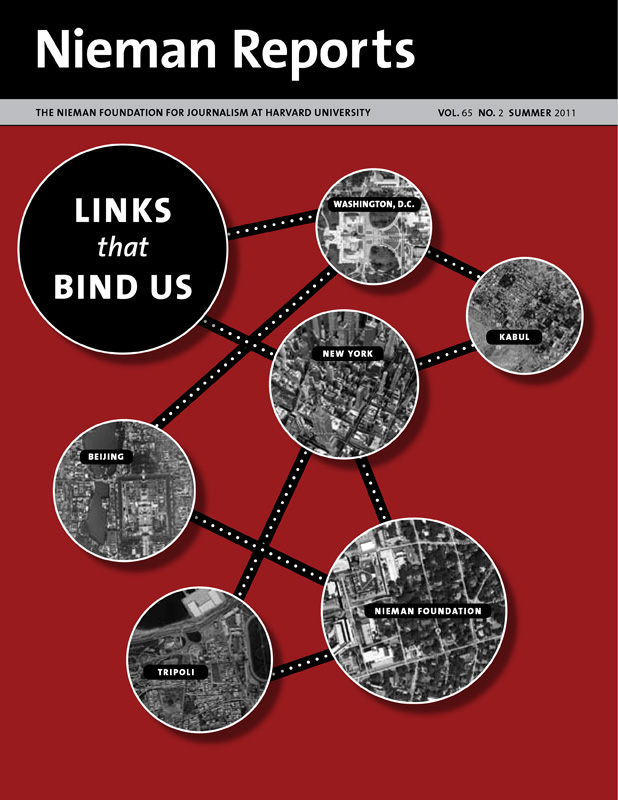RELATED ARTICLES
“Connecting Kids With News in Their Community”
“Media Literacy: Learning Principles”
- Renee HobbsThree instructional practices that are emerging in news literacy deserve closer scrutiny:
Dumbing It Down: Some educators and news practitioners think of teaching news literacy as a journalism class for non-journalists. Essentially, they dump the content of an introductory course in journalism—topics like the reporting process, relationships between reporters and sources, the First Amendment, press law, and ethics—on students for whom these topics hold little intrinsic interest. For most of the students, this class becomes little more than meaningless facts to recall and spit back on an exam. It's unlikely to support the development of essential skills to carry with them. News literacy needs to be thought about as teaching a different set of skills—more focused on those who consume news and not those who produce it, though they are interconnected in many ways.
Telling War Stories: Teaching news literacy only from a journalist's point of view—recounting war stories from the good old days—doesn't work when the real job at hand is to help students develop critical thinking and communication skills. As John McManus wrote in "Detecting Bull," journalists have blind spots when it comes to being aware of how commercial bias affects the ways in which stories get told. Students can be inspired when journalists share their experiences about their work. That's important, but it's not enough.
Romanticizing Journalism: Some news literacy initiatives place a significant emphasis on teaching about the ideals of American journalism. While these are important to talk about, journalism needs to be presented in realistic ways that make sense to students. The public should be able to place their trust in the "news neighborhood," as Howard Schneider, founder of the news literacy program at Stony Brook University, calls it. Journalists should be accurate and fair in their reporting. News should contribute to people's ability to participate as citizens in a democracy. But if the focus is only on the ideals of journalism, then it will be mere propaganda because of its blindness to the reality of today's media maelstrom in which smear fests build audiences and news aggregation services spread misinformation blindingly fast, sometimes leaving truth in the dust.
The bottom line is if a news literacy course leaves students feeling frustrated that American journalistic practices do not meet the idealistic vision we have for journalism as a watchdog on power and a catalyst to democracy, that's OK. As "Mediactive" author Dan Gillmor notes, skepticism is a highly rational approach for news consumers today.
News literacy programs must focus on building learners' critical thinking and creative communication skills. When this happens, news consumers will be better able to understand, appreciate and critique the news while using the tools they've been given to evaluate its fairness, transparency and accuracy.
“Connecting Kids With News in Their Community”
“Media Literacy: Learning Principles”
- Renee HobbsThree instructional practices that are emerging in news literacy deserve closer scrutiny:
Dumbing It Down: Some educators and news practitioners think of teaching news literacy as a journalism class for non-journalists. Essentially, they dump the content of an introductory course in journalism—topics like the reporting process, relationships between reporters and sources, the First Amendment, press law, and ethics—on students for whom these topics hold little intrinsic interest. For most of the students, this class becomes little more than meaningless facts to recall and spit back on an exam. It's unlikely to support the development of essential skills to carry with them. News literacy needs to be thought about as teaching a different set of skills—more focused on those who consume news and not those who produce it, though they are interconnected in many ways.
Telling War Stories: Teaching news literacy only from a journalist's point of view—recounting war stories from the good old days—doesn't work when the real job at hand is to help students develop critical thinking and communication skills. As John McManus wrote in "Detecting Bull," journalists have blind spots when it comes to being aware of how commercial bias affects the ways in which stories get told. Students can be inspired when journalists share their experiences about their work. That's important, but it's not enough.
Romanticizing Journalism: Some news literacy initiatives place a significant emphasis on teaching about the ideals of American journalism. While these are important to talk about, journalism needs to be presented in realistic ways that make sense to students. The public should be able to place their trust in the "news neighborhood," as Howard Schneider, founder of the news literacy program at Stony Brook University, calls it. Journalists should be accurate and fair in their reporting. News should contribute to people's ability to participate as citizens in a democracy. But if the focus is only on the ideals of journalism, then it will be mere propaganda because of its blindness to the reality of today's media maelstrom in which smear fests build audiences and news aggregation services spread misinformation blindingly fast, sometimes leaving truth in the dust.
The bottom line is if a news literacy course leaves students feeling frustrated that American journalistic practices do not meet the idealistic vision we have for journalism as a watchdog on power and a catalyst to democracy, that's OK. As "Mediactive" author Dan Gillmor notes, skepticism is a highly rational approach for news consumers today.
News literacy programs must focus on building learners' critical thinking and creative communication skills. When this happens, news consumers will be better able to understand, appreciate and critique the news while using the tools they've been given to evaluate its fairness, transparency and accuracy.



